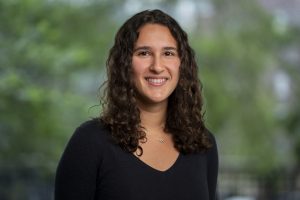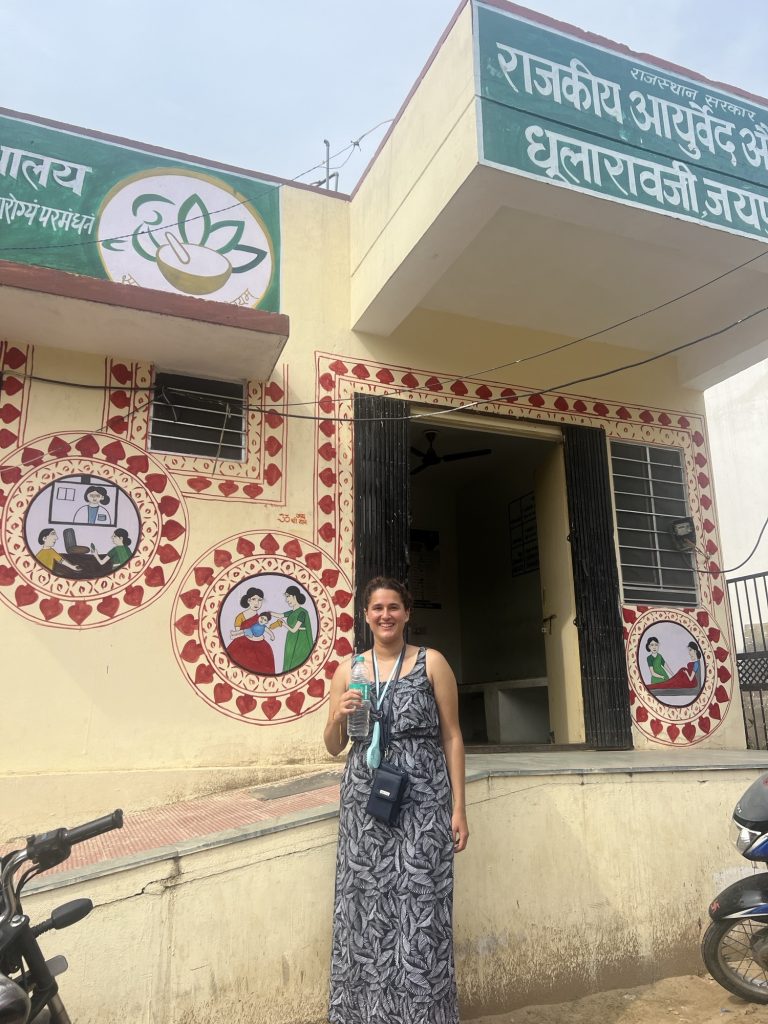
A simple DNA test can detect human papillomavirus infection, or HPV—a common cause of cervical cancer. But access to and knowledge of this often free screening option can be a little more complicated, especially in underserved or rural areas such as those around Mysore, India.
Double majoring in computer science and public health, fourth-year undergraduate Amanda Ferber wants to change that. She embarked to India this summer using funds from her Provost’s Undergraduate Research Award and the Whiting School’s Vredenburg Travel Fund to conduct a study on the barriers preventing women from accessing free cervical cancer screenings—and to use the resulting participant interviews to train a machine translation model to increase awareness of and education on prevention.
In collaboration with her Hopkins mentors—Joseph Gregory Rosen and Kayur Mehta, assistant scientists at the Bloomberg School of Public Health International Vaccine Access Center, and Subhra Chakraborty, a visiting associate professor of global disease epidemiology and control—as well as Purnima Madhivanan, an associate professor of health promotion sciences at the University of Arizona and co-founder of the Public Health Research Institute of India, Ferber wants to determine why women in Mysore aren’t taking full advantage of the free HPV testing that can determine their risk of developing cervical cancer.
“We want to make sure that we’re using our resources effectively to implement these cervical cancer screening programs,” says Ferber. “One piece of that is making sure that people can actually access them.

Ferber outside of a clinic providing botanic therapeutics in a Dhula village in Rajasthan.
“And access looks like a lot of different things. It could be having competing priorities, like not having time to go. It could be the fact that in households—at least where I’m going—men tend to be the primary decision-makers for healthcare-seeking behaviors. Or it could be stigma around sexual activity, cancer in general—there are a lot of different factors that could make it harder for people to access a free program,” she says. “So we want to learn from people; we want to talk to them and see why they may or may not be able to access this screening.”
After collecting and translating this key information, Ferber plans to work with her academic advisor, Professor David Yarowsky—who specializes in machine translation—to train a specialized machine learning model on translating highly specific information about cervical cancer from English to the local language of Kannada.
“Having a translation model that is trained specifically on conversations about cervical cancer could be helpful in translating further educational materials,” Ferber explains.
She adds that she has always been interested in global health.
“My biggest interest is in implementation science: the logistics and planning side of implementing any public health intervention, such as a cervical cancer screening exam. That’s what really gets me excited,” she says.
Ferber decided to pursue computer science to give her an edge in the field.
“It’s very, very important in terms of the way that data is managed,” she explains. “There are a lot of roles in public health where programming and quantitative knowledge could really give you an advantage.”
Ferber will stay in India for 50 nights, doing research for the majority of her time there. This project is a stepping stone toward her ultimate goal in public health: improving access to water for millions.
“I know there are women and girls my age or younger who have to choose between going to school and learning how to read or walking miles and miles a couple days out of the week to go to the wells and get clean water for their family. They have to choose between survival or intellectual freedom. And the fact that that’s a choice for millions of people my age is horrifying to me,” she says. “This is the thing that I want to do. Once I graduate college, I want to find roles in water purification and the expansion of water systems so that it can be more easily accessible.”
Provost Joseph Cooper established the PURA program in 1993 with an endowment by the Hodson Trust to support and encourage Hopkins undergraduate students to engage in independent research, scholarly, and creative projects.